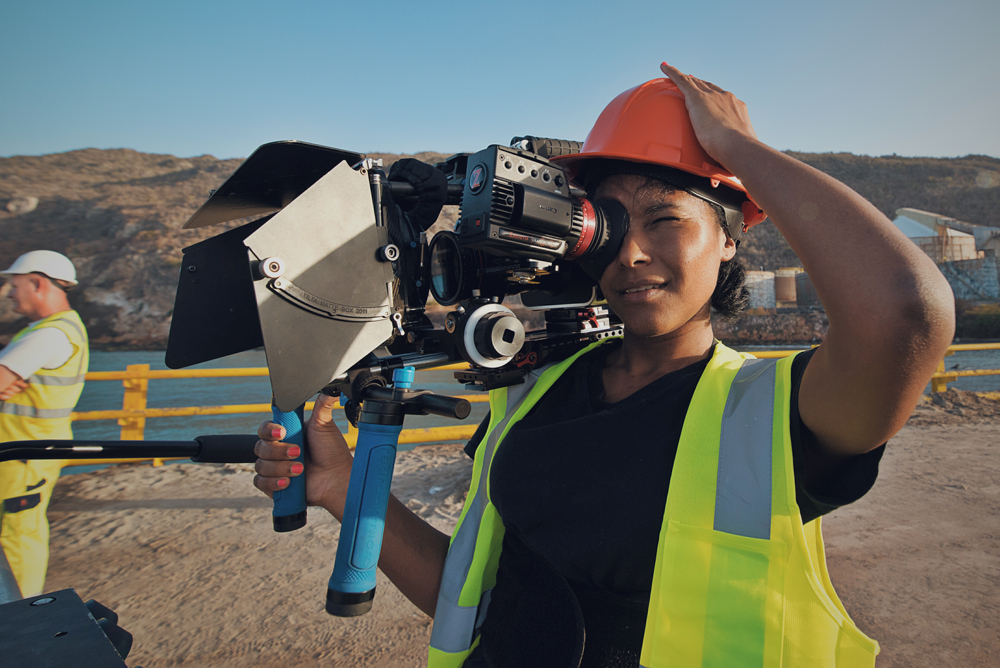“Young Jamaicans explore creative industries”
July 28 As youth unemployment challenges Jamaica’s development, young people are looking towards the Creative Industries to advance their lives. Tamica Parchment, 27, a Commonwealth Correspondent from Kingston, Jamaica, shares the story of Gabrielle Blackwood, a young filmmaker in Jamaica.
As youth unemployment challenges Jamaica’s development, young people are looking towards the Creative Industries to advance their lives. Tamica Parchment, 27, a Commonwealth Correspondent from Kingston, Jamaica, shares the story of Gabrielle Blackwood, a young filmmaker in Jamaica.
“From about eight years old, I was writing and directing plays and mini concerts for family and friends, that for me was fun,” said Gabrielle. “As I got older that transitioned into a love for watching and critiquing films, and it was somewhere in the middle of high school that I realised film making was what I wanted to pursue.”
Film maker Gabrielle Blackwood is just one of the many young Jamaicans who followed their passion into the Creative Industries (mainly graphic design, animation, music and film/television) to find employment as traditional service sectors struggle to meet young Jamaicans’ demand for jobs.
Recognising the challenge at hand, Jamaica’s government has formed partnerships with universities, international agencies such as the World Bank, and other training institutions to support the development of the creative industries, with the hope of making youth employment solutions.
Jamaica’s Ministry of Culture, Gender, Entertainment and Sport and other ministries and agencies have been working to develop programmes such as The Youth Employment in the Digital and Animation Industries Project and JAMPRO and JAFTA’s film development programme PROPELLA!. The aim is to promote the strengthening of the creative industries.
Recently, Jamaica’s Minister of Culture, Gender, Entertainment and Sport, Olivia Grange, appointed an entertainment advisory board to assist in constructing a vibrant creative economy.
The issue to be addressed is alarming. Jamaica’s national rate of youth unemployment stands at approximately 30.3 per cent. It is only a reflection of what is happening in the Caribbean at large. Bahamas, Barbados, Belize and many others are plagued with the issue of youth unemployment, with conditions worsening as economies continue to contract.
There do seem to be growing opportunities for young persons in the creative industries. With access to more technology and social media, many of Jamaica’s youth have been gravitating to promoting their art online and pursuing careers in video production, graphic design and other digital-based
professions.
Last year, Jamaica’s most recognised tertiary arts institution, Edna Manley College, reported to The Jamaica Gleaner that many of the institution’s musicians, graphic designers and visual communicators are approached by their third year for employment due to the rising demand.
However, while these are positive developments, this leaves a large population of young people, especially those who live in under-served communities, at a disadvantage to enter these industries.
There is also another important issue to be addressed. While Jamaica has been celebrated for its cultural contributions to the world, the creative industries in Jamaica is not formalised, leaving a gap that allows low pay and low job security.
Gabrielle says that she personally faced many challenges trying to get into the film industry as a young director in Jamaica.
“In the past when I wanted to study film, there were no film programmes available locally, so I waited, did a BA in Multimedia and then pursued a practical masters in Screen Production in New Zealand,” she said.
Gabrielle said she also faced gender discrimination in the industry.
“There are a lot of people in Jamaica who don’t put women and cameras together in the same thought, so it’s been difficult negotiating for jobs,” she said.
“I’ve found that potential clients will give jobs to male directors of photography more than they do female DPs, even if they love your work, because they just don’t have the confidence in a woman operating, lighting or even holding a camera – or they will negotiate to pay you less and be willing to pay a male DP more.”
Finally, careers in the arts do not receive their appropriate value internationally, but the lack of a formal industry in Jamaica exposes creatives to even lower value of their work.
Gabrielle explained, “Creatively, not many Jamaicans see film making as a viable money making profession, so it’s hard to get funders on board to support artistic projects or ideas for films. We also don’t have sufficient distribution channels, which makes it harder for potential investors to invest if they cannot see the possibility of returns.”
Even with those challenges and the lack of structural support, Jamaica still has amazing opportunities to export its local cultural products. Gabrielle encourages other young Jamaicans to find a good network and support system, and continue pursuing the arts as a career.
“I would say fight hard and be patient. If you want a career in the creative industries, just know there’s a high possibility you’re going to have to ‘tough it out’ for a bit, especially in Jamaica where the arts are still underappreciated.
“It may take years and you may have to moonlight in other areas of work, but that shouldn’t matter, once you know what you’re working towards and believe that it will happen,” she said.
It is surely good advice for thousands of young Jamaicans trying to make it to the top.
Photos courtesy of Tamica Parchment
—————————————————————————————————————————————–
About me: I’m a television editor/producer and business communications specialist. I have a first degree in media and communications and international relations. I enjoy classic literature, art, studying languages and reading about foreign policy and other political issues.
I have two goals I would like to achieve in my lifetime: to travel to many places around the world and to make an impact through media by encouraging behavioural change.
—————————————————————————————————————————————–
Opinions expressed in this article are those of the author and do not necessarily represent the views of the Commonwealth Youth Programme. Articles are published in a spirit of dialogue, respect and understanding. If you disagree, why not submit a response?
To learn more about becoming a Commonwealth Correspondent please visit: http://www.yourcommonwealth.org/submit-articles/
—————————————————————————————————————————————-




